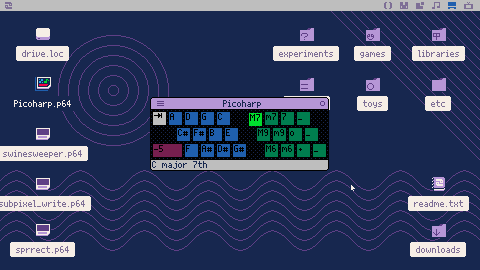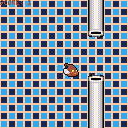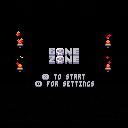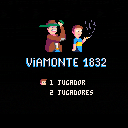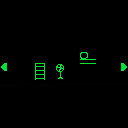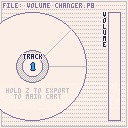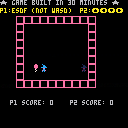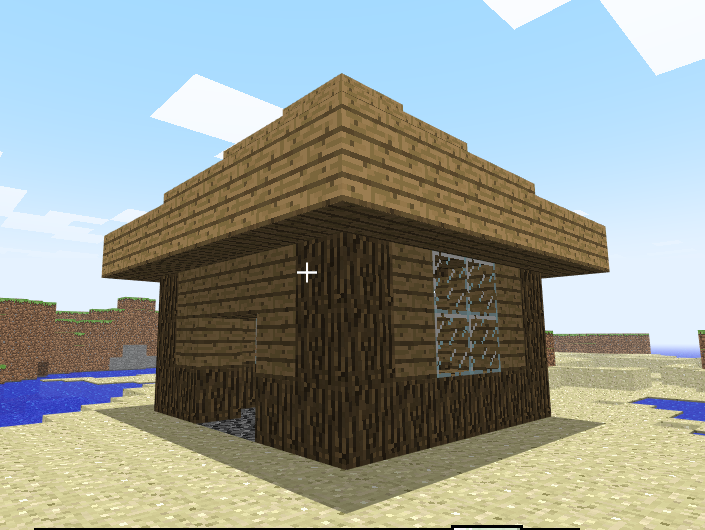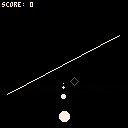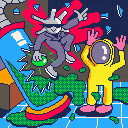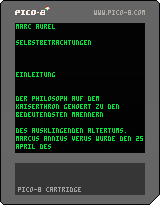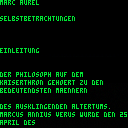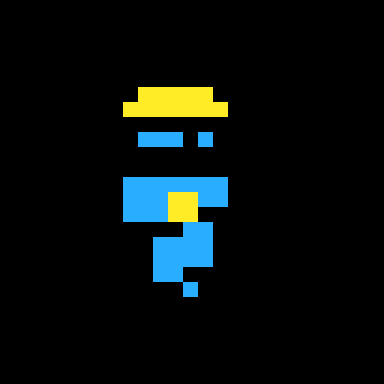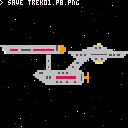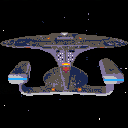Yahtzee!
Standard Yahtzee game, single player with high score table.
I've tried to make it as intuitive and quick to play as possible.
- 3 rolls per round
- select dice/scorecard lines with U/D/L/R
- hold/unhold dice with down button
- go up from dice to set score; jumps to highest scoring line
- dice roll automatically for the next round after setting a score


a little autoharp type thing i am working on!! very very inspired by lynn's autokalimba
Controls
- TAB: show keyboard labels
- SHIFT: transpose bass keys by -5 semitones
- LEFT/RIGHT: change instrument
- UP/DOWN: transpose last pressed key by 1 octave
- SHIFT + UP/DOWN: transpose all keys by 1 octave

A PICO-8 sports game starring Jelpi!
|
|
[8x8] |
Play solo or together in a mashup of tennis, volleyball, squash, and wallball where the only rule is:
two bounces on one side is a point for the other.
Controls
The controls should all be in the game, but for those who aren't familiar with PICO-8: ESDF is used for player 2 instead of WASD so it works on many international keyboards as well as QWERTY.









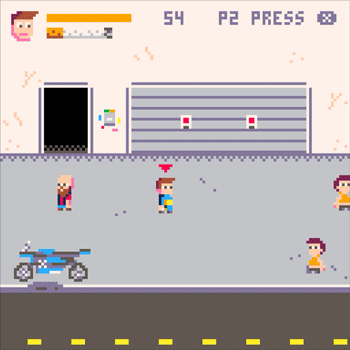
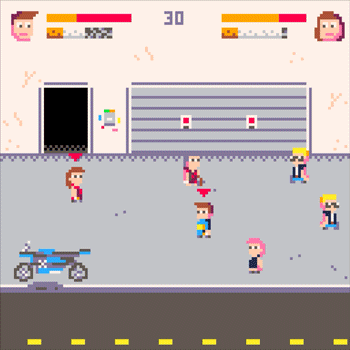
Viamonte 1832
It's a short break between classes. You step out for a quick smoke.
Two drags in, someone knocks your arm.
Five seconds later, you’re pinned between a stranger and a trash can.
A peaceful break? Not quite.
Based on real events.

Controls
Player 1:
- Arrows to move
- Z/X to smoke
Player 2:
- SFED to move
- Q/W to smoke

Music created using loops from Snabisch
Art & code by Valen Cossa
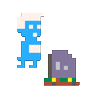




A simplistic program that can change the volumes of songs and sfx, so that you don't have to manually change each note.
During my last project I found some of the pre-made music I chose was either too loud and conflicting with my sound effects, or too quiet. This was a tool I made for myself to help shift the volume of entire songs so that volume mixing was a bit easier. It's a very simple program, nothing special, but hopefully it helps someone else in the same way.
If you run into any glitches or issues, please do let me know!
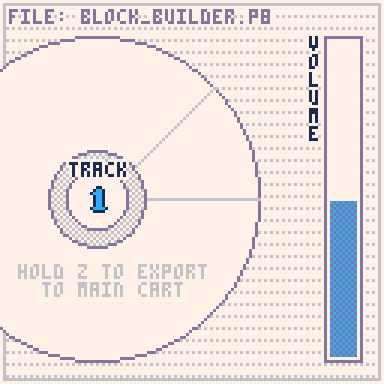
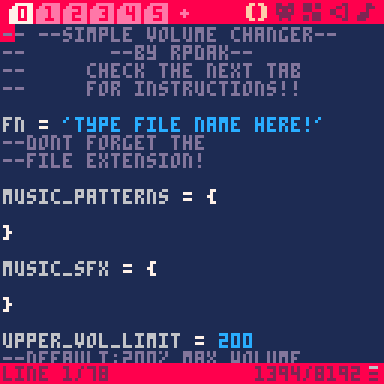
Instructions:
Download the cart, put it in the same folder as your other carts, and open it in the desktop Pico-8 client. In the code, type the name of the cartridge with the audio you're trying to edit (file extension included) as a string in the "fn" variable and run the cartridge.
Left and Right Arrow Keys: Change song/sound
Up and Down Arrow: Increase/Decrease Volume
Z(Hold): Export all songs/sfx
X(In SFX Mode): Play sound
Automatic Mode:
By default, just running the cart should automatically recognize your songs, divide them up, and play them. After you have adjusted the volume to your liking, holding Z will export the changes you made directly to the cartridge you are editing.
If the program isn't making a song loud enough and you think increasing the maximum possible volume percentage would help, the UPPER_VOL_LIMIT variable controls that value, so feel free to mess with it.
DISCLAIMER
"Exporting" is pushing ALL the changes you made to every song, NOT just the currently selected song.
Additionally, changes you make to the target cartridge can be permanent, so I advise you edit a copy of your target cartridge rather than the original!
Manual Mode:
Typing pattern IDs into the MUSIC_PATTERNS table before running the program will make it read only the songs starting at those IDs. You can use this to narrow down which songs are available for editing as a quality of life option, or use it to force a song to start from a certain pattern in the event that the automatic song finder is incorrect.
Example: MUSIC_PATTERNS = {0,5,14,etc.}
SFX Mode:
Typing SFX IDs into the MUSIC_SFX table before running the program will put it into SFX Mode. In this mode you will be able to edit only the specific SFX that you typed into the table. Press the X key to play the selected sound and use the up and down arrow keys to shift its volume as usual.
Example: MUSIC_SFX = {8,9,12,etc.}
Feel Free to Use This However You Want:
This ones under the default CC license as usual, so do with it as you please. I tried to comment what each function I wrote does, so hopefully that will help you pick it apart if need be. I don't currently plan on expanding this really at all. It was just something I already made for myself to use that I cleaned up and added a visual UI to. If, however, there are any other things you think a tool could help with, or an extra functionality I should add to this, let me know! No promises, but I might circle back around to it. I intended to include the ability to change the volume of pattern channels individually, but it got very messy and I would need to rewrite a lot of stuff so I put that on the back burner.
Anyways, enough rambling, thanks for reading this and checking out the tool!
Hi! I wasn't expecting to make a game for Pigsquad's Party themed summer slow jam until I arrived early at the venue and realized I had a laptop and 30 minutes before the showcase started. Everything from the idea for the game, to the artwork, to the code was executed in this time (with the exception of the sound effects, which I took a few seconds to add in before writing this... the venue was too loud for me to do at the time). I'm very proud to say that this game had excellent reception and I'm very excited for whoever is reading this to try it out!
To play, grab a friend! One player uses the arrow keys, and the other uses esdf to move (not wasd, pico-8 defaults to esdf and its too much work to change it for now). You are chasing the balloon! First to reach 10 points wins!
I need help getting my code working, my current goal is to make a version of the example socket program in the docs using the _init and _update functions. my end goal is to make a server that can send and respond to packets from other picotron clients, and I'm hoping to potentially have a UI, hence why I'm using the _update function instead of just running the code without it.
--[[ server (paste in terminal window)
listener = socket("tcp://*:8899")
if (not listener) print("** could not create socket")
local clients = {}
print("")
while (listener) do
print("\rlistening \f8"..("-\\|/")[1+(time()*4%4)\1])
local new_client = listener:accept()
if (new_client) then
print("\r\fcnew client!") print("")
add(clients, new_client)
end
for client in all(clients) do
local dat = client:read()
if (dat) print("\rmessage: "..dat) print""
[ [size=16][color=#ffaabb] [ Continue Reading.. ] [/color][/size] ](/bbs/?pid=171196#p) |



A little while ago I uploaded this cartridge as a fan game dedicated to an amazing band called snooper
Now I am uploading an official collaboration with the band!
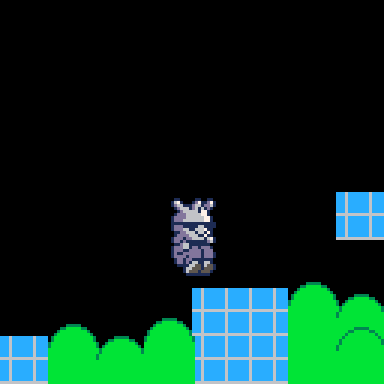
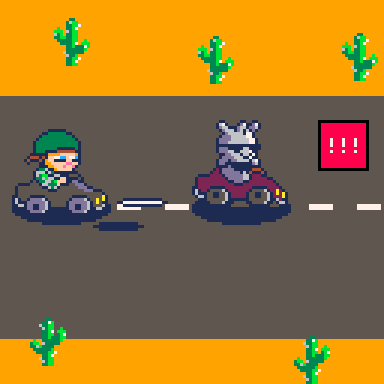
'Worlwide' depicts an origin story for one the bands new puppets which was described to me as a 'radiation man.'
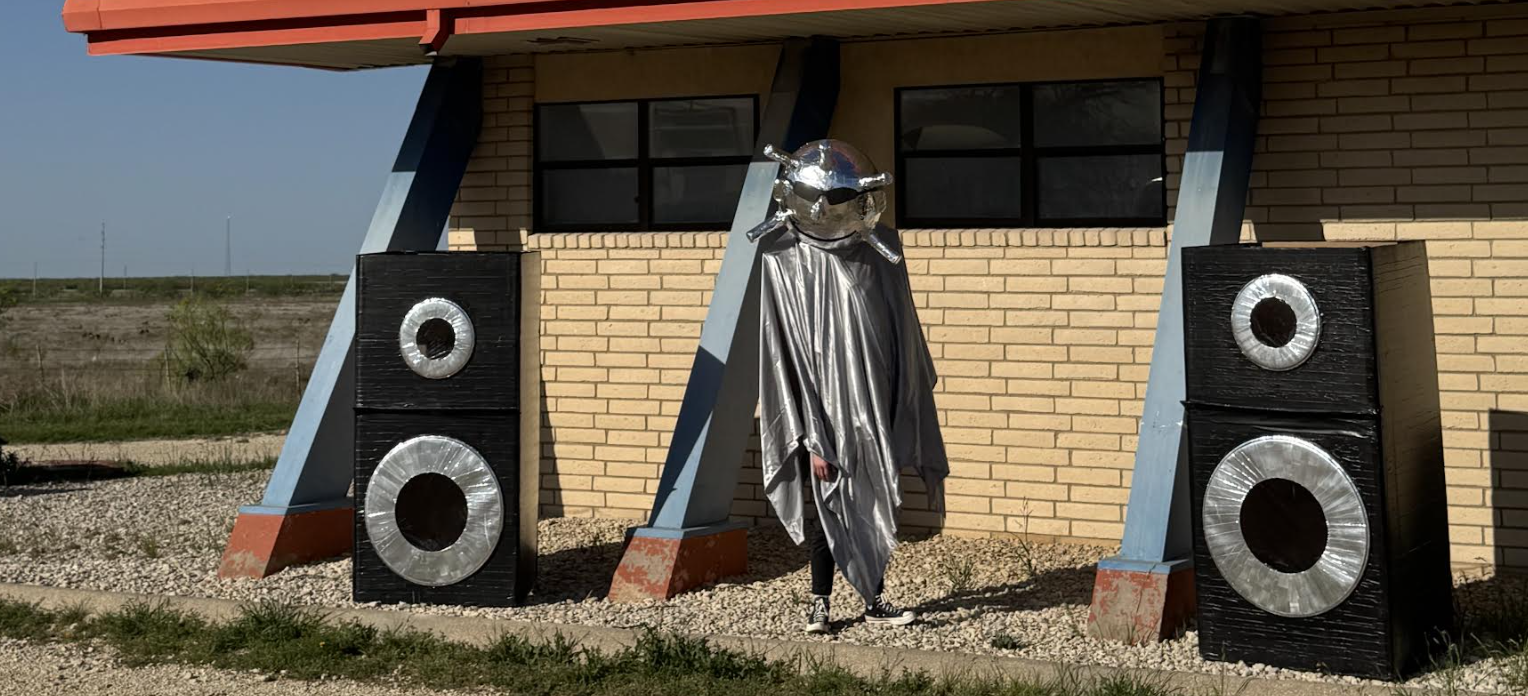
The game portrays 4 simple plot points each with their own unique game mechanics. My personal favourite is the stealth mechanics in the third level.
This cart was made possible with shrinko 8 and mhughson's gfx_export


Hey everyone :)
This is my first game in pico, and actually my first game ever! Its just an ultra short little puzzle adventure game to get my feet wet and practice actually making something. Its really nothing special, but I am super proud to finally have something to show :D There probably isn't much to critique, but any advice or knowledge would be much appreciated, and thank you in advance for taking the time to look at my game!
I had a blast making this, and it was cool to see a basic "story" pop up around the things I was practicing. Like The main character sprite was supposed to be a wizard, but ended up looking like a bard, so I ended up just leaning into that a bit. Lua is not my favorite language by any means... but I works.
I didn't think the tight scope that pico enforces would matter much for me, but it forced me to keep the fluff as simple as possible and just make the damn game.
Now that this is done, I am excited to pick up another project and keep learning! The carts I've seen on here are down right unbelievable, and has me super inspired!

I'm running into some performance issues with my Pico8 USB setup on windows, based on this post where whatever game I am running will freeze, lag, and overall perform badly. I've tried basic games I have made along with ones online and the issues happen no matter what. I have tested Pico8 installed directly on my PC and that does not have any performance issues.
From what I can tell, the usb drive I am using (4gb) has a read/write speed in the range of 10 MB/s, and most likely is USB 2.0, so definitely on the lower end. Is there a R/W range I should look for in a new USB or could it be a different issue?








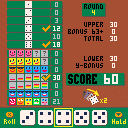
 2 comments
2 comments



